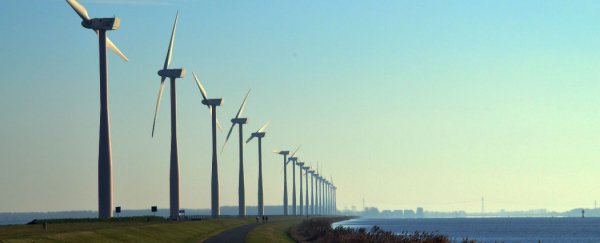With each passing week, renewable energy makes greater and greater strides in supplying more power for our lives, and a lot of that innovation is happening in transport. The Netherlands is the latest country to set the pace for adopting alternative energy sources: the companies in charge of the country's railways are looking to move the entire network over to wind power in the next three years.
Dutch energy company Eneco has just approved a deal to meet that target with the VIVENS rail firms in the country, Gizmodo reports. Wind power already supplies energy for half of the network - some 2,890 km (1,800 miles) of track - so Eneco has until 2018 to source the rest from the Netherlands and its neighbours. The proposed scheme is partly intended to increase renewable energy adoption in other European nations too.
"What makes this contract and partnership unique is that a whole sector decreases its CO2 footprint enormously and sets an example for other sectors to follow," Eneco account manager Michel Kerkhof told Railway Technology. "Mobility is responsible for 20 percent of CO2 emissions in the Netherlands, and if we want to keep travelling, it is important that we do this without burdening the environment with CO2 and particulate matter. This contract offers all Dutch citizens the option to make a climate neutral trip, regardless of distance."
Around 1.2 million passengers travel on trains in the Netherlands every day. Eneco has agreed to supply 1.4 terawatt hours (TWh) of wind-sourced power by 2018, which is roughly the same amount of energy consumed by all the households in Amsterdam, the capital city. Half of that total is expected to come from foreign sources in Scandinavia and elsewhere, with the rest generated in the Netherlands.
Eneco has made a point of using specially built wind farms for the project to avoid putting existing plants under unnecessary pressure and to keep prices down. The railway operators, meanwhile, are making energy efficiency savings in other areas (through train design and driving techniques) in order to keep demand as low as possible - this in turn ensures that the extra price of wind power isn't passed on to customers.
"This partnership ensures that new investments can be made in even newer wind farms, which will increase the share of renewable energy," adds Kerkhof. "In this way, the Dutch railways aim to reduce the greatest negative environmental impact caused by CO2 in such a way that its demand actually contributes to the sustainable power generation in the Netherlands and Europe."
The march of wind power continues unabated all across the world. China is now producing more energy from wind than the US is from nuclear, while Denmark now has enough wind farms to exceed the country's total energy needs at certain points. As more plants come online, the risk of outages due to calm, still days becomes much lower.
